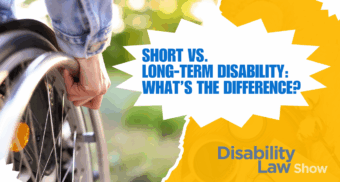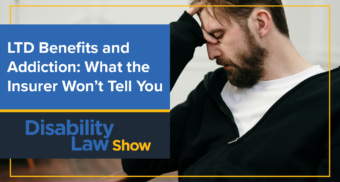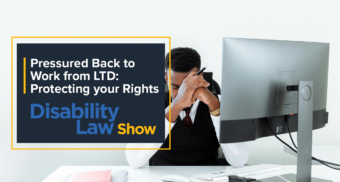Disability Law Show – Season 3 Episode 32
Episode Summary
SURVEILLANCE AND LTD CLAIMS on Season 3 Episode 32 of the Disability Law Show with disability lawyer and Partner, James K. Fireman.
Watch above to discover the steps you need to take when the insurance company cuts off or denies your long-term disability claim in Ontario, British Columbia, or Alberta, on the only disability law show on TV and radio in Canada.
Episode Notes
After the work hardening program disability worsened
I worked at a physical job and had a significant back injury. My insurer approved my benefits but then sent me for an independent medical assessment. I was sent for a work-hardening program in the hopes of returning me to the job I was already told by my doctor I couldn’t do. My pain increased and now I don’t know what to do.
- Rehabilitation programs for claimants: Insurance companies have an obligation to operate in good faith with claimants. Insurers who are proven to cause undue stress and hardship for a claimant could be forced to pay punitive damages.
Disability benefits are cut off as the insurer believes a return to work is possible
My wife had a kidney transplant. She took time off through medical insurance benefits, which her employer was great about. However, the insurance company decided to cut off her benefits after three months, saying she is now able to return to work. Her doctor says she needs more time off due to complications.
- Benefits cut off by insurer: Ultimately, a claimant’s doctor is the only individual that can clear someone to return to work as the decision is a medical confirmation and not a legal decision. Claimants who return to work before they are physically ready can potentially make their condition worse. In many cases, insurance companies don’t apply common sense to a claimant’s situation and don’t follow a doctor’s timeline for when a claimant will be able to return to work.
Surveillance and LTD Claims
- Why do LTD insurers use surveillance: Insurance companies are in business to create a profit and typically don’t like to spend money. Despite this, by hiring outside investigators insurers believe that surveillance will bring evidence to light that will lead to a claimant losing their benefits, thus saving the insurer money.
- Learn More
• Surveillance and long-term disability claims
- Learn More
- Should I do anything differently: It is important for claimants who have a legitimate disability to continue their daily life as their claim is legitimate. Claimants who feel they are being followed and are uncomfortable can contact the police to ensure their safety.
- Can LTD insurers cut off LTD payments: Insurance companies can cut off a claimant’s benefits after surveillance and are within their rights to do so if a claim is fraudulent. However often surveillance does not indicate evidence for the insurers to cut off benefits particularly if a claimant does not have a physical disability. Surveillance often is instead evidence of a claimant’s disability.
- What to do if their LTD benefits end due to surveillance: Claimants should contact a disability lawyer as soon as possible; often consultations are free and legal fees are typically on a contingency basis. Once a legal claim is filed, surveillance must be provided to the disability lawyer.
Insurer surveillance as proof to deny LTD benefits
I’ve been a private teacher for more than twenty years. I had a really bad concussion early last year and now suffer from headaches and noise sensitivity. I can barely look after my 5-year-old son. I applied for LTD benefits but was denied. When I appealed, they claim that surveillance showed that I was able to function normally.
- Surveillance leads to LTD denial: Surveillance that is used to observe claimants with a mental health illness or cognitive issues is often not usable as it is difficult to observe this disability. Insurance companies will often pick selective instances from surveillance as an affirmation to deny or cut off LTD benefits.
Returning to work but scared of a mental health relapse
I’ve been on LTD for the last 3 years because of depression. A few months ago, I made something of a breakthrough in my treatment and am feeling much better. I’d like to go back to work, but I’m not sure whether I should try. If I decide to return, how do I go about making this happen? What happens if things don’t work out and I regress?
- Mental health concerns: Claimants who are on disability benefits and are slowly improving and have their doctor’s approval, should try and return to work. It is important to communicate with a doctor and receive their confirmation as well as possible limitations and necessary accommodations in order to make the return to work successful. If a claimant’s return to work is not successful, most insurance policies have a reoccurrence clause that states if a return to work is unsuccessful, benefits will be re-instated without the initial waiting period.
Next Episode: Disability Law Show S3 E33 – If denied LTD, what to expect when you hire Samfiru Tumarkin LLP
Previous Episode: Disability Law Show S3 E31 – Invisible Illness and Disability Claims




